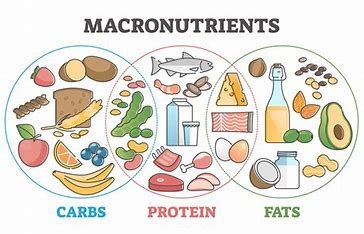Understanding macronutrients and micronutrients is essential for maintaining a balanced and healthy diet.

Macronutrients
Macronutrients are nutrients that the body needs in large amounts to provide energy and support bodily functions. They include:
1. Carbohydrates
- Function: Provide the body’s primary source of energy.
- Sources: Grains, fruits, vegetables, legumes, and dairy products.
- Types: Simple carbohydrates (sugars) and complex carbohydrates (starches and fiber).
2. Proteins
- Function: Essential for building and repairing tissues, producing enzymes and hormones, and supporting immune function.
- Sources: Meat, fish, eggs, dairy products, legumes, nuts, seeds, and soy products.
- Types: Complete proteins (contain all essential amino acids) and incomplete proteins (lack one or more essential amino acids).
3. Fats
- Function: Provide a concentrated source of energy, support cell growth, protect organs, and aid in the absorption of fat-soluble vitamins.
- Sources: Avocados, nuts, seeds, oils, fatty fish, and dairy products.
- Types: Saturated fats, unsaturated fats (monounsaturated and polyunsaturated), and trans fats.
Micronutrients
Micronutrients are nutrients that the body needs in smaller amounts but are still essential for proper functioning. They include vitamins and minerals:
Vitamins
- Fat-Soluble Vitamins:
- Vitamin A: Supports vision, immune function, and skin health.
- Sources: Carrots, sweet potatoes, spinach, and dairy products.
- Vitamin D: Aids in calcium absorption and bone health.
- Sources: Sunlight, fortified milk, fatty fish, and egg yolks.
- Vitamin E: Acts as an antioxidant and supports skin health.
- Sources: Nuts, seeds, and vegetable oils.
- Vitamin K: Essential for blood clotting and bone health.
- Sources: Leafy greens, broccoli, and Brussels sprouts.
- Vitamin A: Supports vision, immune function, and skin health.
- Water-Soluble Vitamins:
- Vitamin C: Supports immune function and acts as an antioxidant.
- Sources: Citrus fruits, strawberries, bell peppers, and broccoli.
- B Vitamins: Includes B1 (thiamine), B2 (riboflavin), B3 (niacin), B5 (pantothenic acid), B6 (pyridoxine), B7 (biotin), B9 (folate), and B12 (cobalamin).
- Functions: Energy production, red blood cell formation, and nervous system health.
- Sources: Whole grains, meat, eggs, dairy, leafy greens, and legumes.
- Vitamin C: Supports immune function and acts as an antioxidant.
Minerals
- Macrominerals: Needed in larger amounts.
- Calcium: Essential for bone and teeth health, muscle function, and nerve signaling.
- Sources: Dairy products, leafy greens, and fortified plant milks.
- Potassium: Regulates fluid balance, muscle contractions, and nerve signals.
- Sources: Bananas, potatoes, and legumes.
- Magnesium: Supports muscle and nerve function, and energy production.
- Sources: Nuts, seeds, and whole grains.
- Calcium: Essential for bone and teeth health, muscle function, and nerve signaling.
- Trace Minerals: Needed in smaller amounts.
- Iron: Important for oxygen transport in the blood.
- Sources: Red meat, beans, and fortified cereals.
- Zinc: Supports immune function and wound healing.
- Sources: Meat, shellfish, and legumes.
- Iodine: Necessary for thyroid function.
- Sources: Iodized salt, seafood, and dairy products.
- Iron: Important for oxygen transport in the blood.
Conclusion:
Both macronutrients and micronutrients are vital for maintaining overall health and well-being. A balanced diet that includes a variety of foods ensures you get the right amounts of these essential nutrients.
